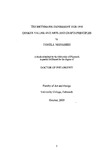Brynmawr experiment 1928-1940 : Quaker values and arts and crafts principles
| dc.contributor.author | Manasseh, Pamela | |
| dc.contributor.other | Faculty of Arts, Humanities and Business | en_US |
| dc.date.accessioned | 2011-05-11T08:43:32Z | |
| dc.date.available | 2011-05-11T08:43:32Z | |
| dc.date.issued | 2009 | |
| dc.identifier | Not available | en_US |
| dc.identifier.uri | http://hdl.handle.net/10026.1/358 | |
| dc.description.abstract |
This is a study of the social work of Quakers in the town of Brynmawr in South Wales during the depressions of the 1920s and 1930s. The work, which took place during the years 1928 to 1940, has become known as the Brynmawr Experiment. The initial provision of practical and financial relief for a town suffering severely from the effects of unemployment, was developed with the establishment of craft workshops to provide employment. Special reference is made to the furniture making workshop and the personnel involved with it. The thesis attempts to trace links between the moral and aesthetic values of Quakerism and the Arts and Crafts Movement and explores the extent to which the guiding principles of the social witness project and the furniture making enterprise resemble those of the Arts and Crafts Movement of the inter-war years, 1919-1939. All aspects of the Quaker work at Brynmawr were prompted by concern for social justice and upholding the dignity of each individual. These were also the concerns of John Ruskin and William Morris which motivated the formation of the Arts and Crafts Movement in the! 880s. The Arts and Crafts principles which persisted into the twentieth century in the craft communities of C. R. Ashbee and of Eric Gill, and in the craftsmanship of the Cotswold furniture makers, provides an Arts and Crafts context for the Brynmawr furniture. It is argued that similarities between the aesthetic and moral principles of the members of the Religious Society of Friends (Quakers) and those of Ruskin, Morris and their followers establish a synonymity in which they are linked by a common integrity. It is further argued that as a social project arising out of and responding to the specific economic conditions of the time, the Brynmawr Experiment and its furniture making enterprise is, by virtue of such links with Arts and Crafts, a potentially unique Quaker social witness project. | en_US |
| dc.language.iso | en | en_US |
| dc.publisher | University of Plymouth | en_US |
| dc.title | Brynmawr experiment 1928-1940 : Quaker values and arts and crafts principles | en_US |
| dc.type | Thesis | |
| dc.identifier.doi | http://dx.doi.org/10.24382/3628 |
Files in this item
This item appears in the following Collection(s)
-
01 Research Theses Main Collection
Research Theses Main


